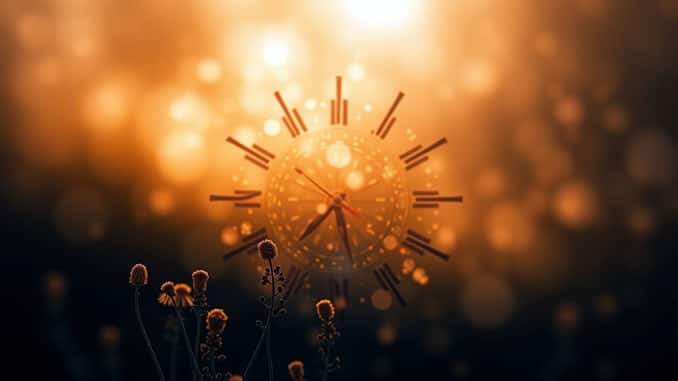
The Inner Clock of Life: How Chronobiology Influences Our Well-being and Spirituality
In the intricate tapestry of human existence, there's a hidden conductor orchestrating the rhythms of our lives – our internal biological clock. This fascinating field of study, known as chronobiology, unveils the profound impact of natural cycles on our physical, mental, and even spiritual well-being. Let's embark on a journey to explore how this inner timekeeper shapes our lives and connects us to the greater rhythms of the universe.
Understanding Chronobiology: The Science of Life's Rhythms
Chronobiology is the study of biological rhythms and how they interact with our internal and external environments. These rhythms, primarily influenced by the 24-hour cycle of day and night, regulate various physiological processes:
- Sleep-wake cycles
- Hormone production
- Body temperature fluctuations
- Cognitive performance
The Circadian Rhythm: Our Master Clock
At the heart of chronobiology lies the circadian rhythm, our body's internal 24-hour clock. This master timekeeper, located in the suprachiasmatic nucleus of the brain, synchronizes our bodily functions with the external world, particularly the cycle of light and darkness.
The Impact on Physical Well-being
Understanding and aligning with our natural rhythms can significantly enhance our physical health:
- Improved Sleep Quality: Respecting our circadian rhythm leads to better sleep patterns and overall restfulness.
- Enhanced Metabolism: Our digestive system and metabolism function optimally when we eat in sync with our internal clock.
- Boosted Immune Function: The immune system operates on a circadian schedule, influencing our body's defense mechanisms.
Mental Health and Cognitive Performance
Our internal clock doesn't just affect our bodies; it profoundly influences our minds:
- Mood Regulation: Disruptions in circadian rhythms are linked to mood disorders like depression and bipolar disorder.
- Cognitive Sharpness: Our ability to focus, remember, and problem-solve fluctuates throughout the day, peaking at certain times.
- Stress Management: Aligning our activities with our natural rhythms can reduce stress and improve overall mental well-being.
The Spiritual Dimension of Chronobiology

Interestingly, the concept of internal rhythms resonates deeply with many spiritual traditions:
Ancient Wisdom and Modern Science
Many ancient practices, from Ayurveda to Traditional Chinese Medicine, have long recognized the importance of living in harmony with natural cycles. Modern chronobiology provides scientific validation for these age-old insights.
Meditation and Prayer Timing
Some spiritual practitioners find that certain times of the day, often aligned with circadian peaks, are more conducive to meditation and prayer. This could be due to natural fluctuations in alertness and introspective capacity.
Connecting with Universal Rhythms
Understanding our internal rhythms can foster a deeper sense of connection with the natural world and the cosmos. It reminds us that we are part of a larger, rhythmic universe.
Practical Applications: Living in Harmony with Your Inner Clock
Incorporating chronobiological insights into daily life can lead to profound improvements in well-being:
- Consistent Sleep Schedule: Maintain regular sleep and wake times, even on weekends.
- Strategic Light Exposure: Seek bright light during the day and limit blue light exposure in the evening.
- Timed Eating: Align meal times with your body's natural digestive rhythms.
- Optimized Work Schedules: Plan demanding tasks during your peak cognitive hours.
- Mindful Technology Use: Be aware of how digital devices can disrupt natural rhythms.
Challenges in Modern Society
Despite the benefits of living in tune with our internal clocks, modern life often presents challenges:
- Shift Work: Irregular work schedules can severely disrupt circadian rhythms.
- Jet Lag: Rapid time zone changes can throw off our internal clocks.
- Social Jet Lag: Differences between workweek and weekend schedules can create internal desynchronization.
The Future of Chronobiology
As research in chronobiology advances, we're likely to see:
- More personalized approaches to health and wellness based on individual chronotypes.
- Chronotherapy in medicine, timing treatments to align with patients' biological rhythms.
- Increased awareness and implementation of chrono-friendly policies in workplaces and schools.
Conclusion: Embracing the Rhythm of Life
Understanding and respecting our internal biological rhythms offers a pathway to enhanced physical health, mental clarity, and spiritual connection. By aligning our lives with these natural cycles, we can tap into a deeper sense of harmony with ourselves and the world around us.
As we navigate the complexities of modern life, the insights of chronobiology remind us of our intrinsic connection to the rhythms of nature. By honoring these internal cycles, we open ourselves to a more balanced, healthful, and spiritually attuned existence.
In the grand symphony of life, our internal clock plays a crucial melody. By listening to and harmonizing with this innate rhythm, we can dance more gracefully through the cycles of our days and our lives, finding greater well-being, purpose, and connection along the way.
03.11.2024
Heike Schonert
HP für Psychotherapie und Dipl.-Ök.
Heike Schonert
Heike Schonert, alternative practitioner for psychotherapy, qualified economist. As an author, journalist and designer of this magazine, she puts her whole heart and knowledge into this task.
The magazine's great success is a tireless drive to help provide this earth and all its living beings with a livable and lovable environment that serves the community and connection of all living beings.
Her motto is: “If we are honest with ourselves, understand ourselves as a whole and are filled with the desire to heal ourselves and love ourselves as we are, we will pass this love on to other people and grow with them. “






Hinterlasse jetzt einen Kommentar